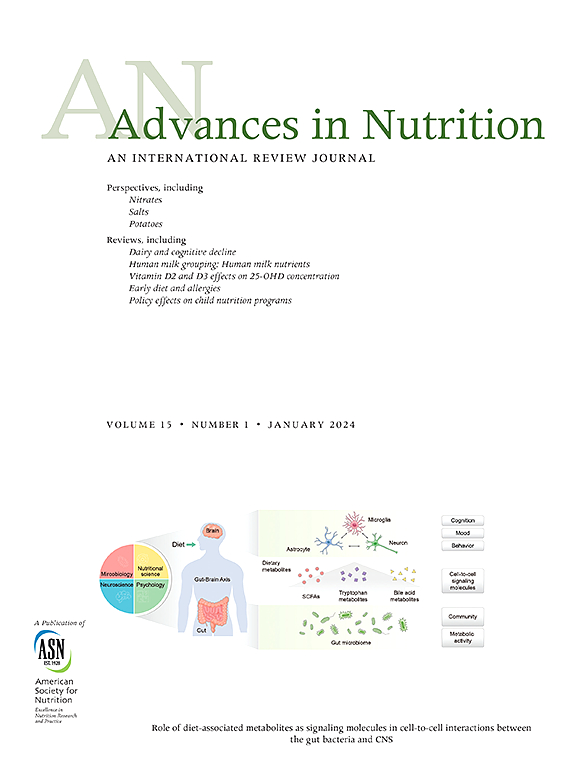营养干预治疗癌症治疗期间胃肠道症状:一项系统综述和荟萃分析。
IF 9.2
1区 医学
Q1 NUTRITION & DIETETICS
引用次数: 0
摘要
现代癌症治疗在减轻肿瘤负担和延长寿命方面具有显著效果。然而,癌症治疗也会诱发各种胃肠道(GI)副作用,这些副作用会限制剂量,降低生活质量,并可能导致治疗失败。接受癌症治疗的患者的标准医学营养治疗侧重于预防体重减轻和营养不良,而不是减轻胃肠道症状。因此,本研究的目的是通过系统回顾和荟萃分析来评估营养疗法对减少癌症治疗期间胃肠道副作用的疗效。系统检索Scopus和PubMed数据库。对符合纳入标准的文章进行荟萃分析,以估计胃肠道症状的综合效应大小,并按营养干预类型(营养补充、口服营养补充或饮食咨询)进行分类。进一步的亚组分析是基于癌症类型、癌症治疗和营养干预。所有统计分析均在Stata/MP 17.0版本中进行,采用双侧检验,p < 0.05为统计学显著性阈值。搜索算法捕获了15556篇文章,139篇研究符合meta分析的纳入标准。文章报道了12种不同的胃肠道症状,总共进行了151项荟萃分析,涉及症状、癌症治疗和营养干预亚型。Meta分析表明,总的来说(所有干预措施结合起来),营养补充减少了恶心、呕吐和腹泻的发生率(均p < 0.001)。口服营养补充剂对胃肠道症状无影响(p < 0.05)。饮食咨询减少了便秘和腹泻的发生率。虽然个体营养补充干预可以减轻症状,但益生菌补充对腹痛、呕吐和腹泻的发生率有最强的影响。这项荟萃分析支持在癌症治疗期间实施特定的医学营养疗法来治疗胃肠道症状,并确定那些需要进一步调查的症状。鉴于研究内部和研究之间的反应差异很大,未来的实验应探索个性化的基于营养的策略,以优化治疗效果。系统评价或荟萃分析的注册和注册编号:该研究在PROSPERO注册为549116。本文章由计算机程序翻译,如有差异,请以英文原文为准。
Nutrition Interventions in the Treatment of Gastrointestinal Symptoms during Cancer Therapy: A Systematic Review and Meta-analysis
Modern cancer therapy is effective at reducing tumor burden and extending lifespan. However, cancer therapy also induces various gastrointestinal (GI) side-effects that are dose-limiting, reduce quality of life, and potentially lead to treatment failure. Standard medical nutrition therapy for patients undergoing cancer treatment focuses on preventing weight loss and malnutrition but not reducing GI symptoms. Therefore, the objective of this study was to assess efficacy of nutrition therapy to reduce GI side-effects during cancer treatment via systematic review and meta-analysis. A systematic search was conducted in Scopus and PubMed databases. A meta-analysis was performed on articles meeting inclusion criteria to estimate the pooled effect size on GI symptoms, separated by nutrition intervention type (nutrient supplementation, oral nutrition supplement, or dietary counseling). Further subgroup analyses were conducted based on cancer type, cancer therapy, and nutrient intervention. All statistical analyses were performed in Stata/MP version 17.0 using 2-sided tests with P < 0.05 as the threshold for statistical significance. A total of 15,556 articles were captured by the search algorithm, and 139 studies met inclusion criteria for meta-analysis. Articles reported 12 different GI symptoms, resulting in 151 total meta-analyses across symptom, cancer treatment, and nutrition intervention subtypes. Meta analyses indicated that collectively (all interventions combined), nutrient supplementation reduced nausea, vomiting, and diarrhea incidence (all P < 0.001). Oral nutrition supplements had no effects on GI symptoms (all P > 0.05). Dietary counseling reduced constipation and diarrhea incidence. Although 9 individual nutrient supplementation interventions reduced 8 symptoms, probiotic supplementation had some of the strongest effects on abdominal pain, vomiting, and diarrhea incidence. This meta-analysis supports implementation of specific medical nutrition therapies to treat GI symptoms during cancer therapy and identifies those requiring additional investigation. Given the large variation in responses within and across studies, future experiments should explore personalized nutrition-based strategies to optimize treatment efficacy.
This study was register at PROSPERO as 549116.
求助全文
通过发布文献求助,成功后即可免费获取论文全文。
去求助
来源期刊

Advances in Nutrition
医学-营养学
CiteScore
17.40
自引率
2.20%
发文量
117
审稿时长
56 days
期刊介绍:
Advances in Nutrition (AN/Adv Nutr) publishes focused reviews on pivotal findings and recent research across all domains relevant to nutritional scientists and biomedical researchers. This encompasses nutrition-related research spanning biochemical, molecular, and genetic studies using experimental animal models, domestic animals, and human subjects. The journal also emphasizes clinical nutrition, epidemiology and public health, and nutrition education. Review articles concentrate on recent progress rather than broad historical developments.
In addition to review articles, AN includes Perspectives, Letters to the Editor, and supplements. Supplement proposals require pre-approval by the editor before submission. The journal features reports and position papers from the American Society for Nutrition, summaries of major government and foundation reports, and Nutrient Information briefs providing crucial details about dietary requirements, food sources, deficiencies, and other essential nutrient information. All submissions with scientific content undergo peer review by the Editors or their designees prior to acceptance for publication.
 求助内容:
求助内容: 应助结果提醒方式:
应助结果提醒方式:


